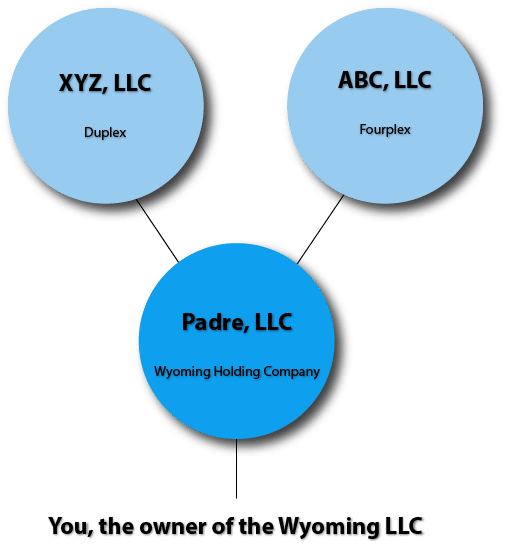You must be very careful when you are the only owner of your LLC. Single member LLCs require extra planning and special language in the operating agreement.
One example: What happens when the single owner/member passes? Who takes over? It may be months before that is sorted out, and your business will falter without a clear leader.
Difficulties of Owning a Single Member LLC
You want the asset protection benefits of a limited liability company. But what if you don’t want any partners? What if you want to be the sole owner of your own LLC?
You can do that with a single owner LLC (sometimes known as a single member LLC).
But you have to be careful.
Before we discuss how to properly set up and use a single owner LLC we must acknowledge a nationwide trend. Courts are starting to deny sole owner LLCs the same protection as multiple member LLCs. The reason has to do with the charging order.
The charging order is a court order providing a judgment creditor (someone who has already won in court and is now trying to collect) a lien on distributions. A chart helps to illustrate:

John was in a car wreck. Moe does not have a claim against XYZ, LLC itself. The wreck had nothing to do with the duplex. Instead, Moe wants to collect against John’s assets, which is a 50% interest in XYZ, LLC. Courts have said it is not fair to Mary, the other 50% owner of XYZ, to let Moe come crashing into the LLC as a new partner. Instead, the courts give Moe a charging order, meaning that if any distributions (think profits) flow from XYZ, LLC to John then Moe is charged with receiving them.
Moe is not a partner, can’t make decisions or demands, and has to wait until John gets paid. If John never gets paid, neither does Moe. The charging order not only protects Mary but is a useful deterrent to frivolous litigation brought against John. Attorneys don’t like to wait around to get paid.
But what if there is only a single owner?

In this illustration there is no Mary to protect. It’s just John. Is it fair to Moe to only offer the charging order remedy? Or should other remedies be allowed?
How the Court Has Ruled Against LLCs With One Member
In June of 2010, the Florida Supreme Court decided the Olmstead vs. FTC case on these grounds. In a single owner LLC there are no other members to protect. The court allowed the FTC to seize Mr. Olmstead’s membership interests in order to collect. Other states have followed the trend.
Interestingly, even two of the strongest LLC states have denied charging order protection to single owner LLCs in limited circumstances.
In September of 2014, the US District Court in Nevada decided the bankruptcy case of In re: Cleveland.
The court held that the charging order did not protect a single member LLC owner in bankruptcy. Instead, the bankruptcy trustee could step into the shoes of the single owner and manage the LLC. This is not surprising since bankruptcy trustees have unique and far reaching powers, which are routinely upheld by the courts. (But know that, incredibly enough, a bankruptcy trustee can’t get control of the shares of a Nevada corporation. This is a special planning opportunity available to Nevada residents – or those who may become Nevada residents.)
In November of 2014, the Wyoming Supreme Court rendered a surprising verdict in the Greenhunter case.
The court held that the veil of a single owner LLC could be pierced. The issue centered on a Texas company’s use of a Wyoming LLC it solely owned. The LLC was undercapitalized (meaning not enough money was put into it) and it incurred all sorts of obligations. It wasn’t fair for the Texas company for the single owner to hide behind the LLC. The fact that a single owner LLC was involved was a material issue. The court pierced through the LLC and held the Texas company liable for the LLC’s debts.
Even though these are fairly narrow cases, both Nevada and Wyoming have held against single member LLCs. Again, this is the trend.
Luckily there are some things you can do to protect your assets as a single member LLC…
Strategies for Protecting Your Assets
One strategy is to set up a multi-member LLC structured in a way that gives the intended single member all of the decision making power. For example, parents can have adult children over 18 become member(s) or for those under 18 you can use a Uniform Gift to Minors Act designation. You may want to use an irrevocable spendthrift trust for children or others. A local estate planning attorney can help you set these up correctly.
But what is the smallest percentage you have to give up for the second member? Could you give up just 1/100th of 1 percent? Most practitioners feel that the percentage should not be inordinately low and that 5% is a suitable second member holding. So the ideal structure would be that John owns 95% of the LLC and the other 5% is owned by a child (or other family member) and/or an irrevocable trust.
Accordingly, in a state that doesn’t protect single owner LLCs, you have an excellent argument for charging order protection. There is a legitimate second member to protect. To further that legitimacy it is useful to have the second member participate in the affairs of the LLC. Attending meetings and making suggestions recorded into the meeting minutes is a good way to show such involvement.
But what if you don’t want to bring in a second member?
There are plenty of good reasons to set up a sole owner LLC. Other owners can bring a loss of privacy and protection. And if you paid 100% for the whole asset, why should you bring in another member anyway? Or, what if you don’t have any children or other family members that you want to bring in?
If a single member LLC is truly the best fit for you, there are three key factors to know and deal with.
1. The Corporate Veil
Many states’ LLC laws do not require annual meetings or written documents. Some see this as a benefit but it is actually a curse.
If you don’t follow the corporate formalities (which now apply to LLCs) a creditor can pierce the veil of protection and reach your personal assts. With a single owner LLC this is especially problematic. Because you are in complete management control it may appear that you aren’t respecting the entity’s separate existence or that you are comingling the LLC’s assets with your own personal assets. Without a clear distinction of the LLC’s separate identity, a creditor could successfully hold you personally responsible for the debts of the LLC (as they did in Wyoming’s Greenhunter case above.) Maintaining proper financial books and records and keeping LLC minutes can help demonstrate a definitive and separate identity for your single owner LLC. You must work with a company which appreciates the importance of this for single owner LLCs.
2. Different State Laws
LLC laws vary from state to state. Some states offer single owner LLCs very little protection. The states of California, Georgia, Florida, Utah, New York, Oregon, Colorado and Kansas, among others, deny the charging order protection to single owner LLCs.
Other states offer single owner LLCs a very high level of protection in traditional circumstances. So we have to pick our state of formation very carefully. In order to deal with this trend against protection, we use the states that do protect single member LLCs.
Wyoming, Nevada, Delaware, South Dakota and Alaska (collectively “the strong states”), have amended their LLC laws to state that the charging order in standard collection matters is the exclusive remedy for judgment creditors – even against single owner LLCs.
So how do we use these state laws to our advantage? Let’s consider an example:

In this example, John owns a fourplex in Georgia and a duplex in Utah. Each property is held in an in-state LLC (as required to operate in the state). The Georgia and Utah LLCs are in turn held by one Wyoming LLC. (This structure works in every state except California, which requires extra planning. Be sure to take advantage of our free 15-minute consultation if you are operating or residing in California).
I break down potential lawsuits into two different types of attacks: Attack #1, the inside attack and Attack #2, the outside attack.
In Attack #1, the inside attack, a tenant sues over a problem at the fourplex owned by GEORGIA, LLC. They have a claim against the equity inside that LLC. Whether GEORGIA, LLC is a single owner or multi-owner LLC doesn’t matter. The tenant’s claim is against GEORGIA, LLC itself. Importantly, the tenant can’t get at the assets inside UTAH, LLC or WYOMING, LLC. They are shielded since the tenants only claim is against GEORGIA, LLC.
The benefit of this structure comes in Attack #2, the outside attack. If John gets in a car wreck, it has nothing to do with GEORGIA, LLC or UTAH, LLC. But, the car wreck victim would like to get at those properties to collect on the judgment. If John held GEORGIA, LLC and UTAH, LLC directly in his name, the judgment creditor could force a sale of the fourplex and duplex since neither state protects single owner LLCs.
However, since John is the sole owner of WYOMING, LLC he is protected by Wyoming’s strong laws. The attacker can only get at WYOMING, LLC and gets a charging order, which means they have to wait until John gets a distribution and therefore could possibly never get paid. If John doesn’t take any distributions, there’s no way for the attacker (or his attorney) to collect. A strong state LLC offers a real deterrent to litigation, even for single owner LLCs.
3. Operating Agreement
Like bylaws for a corporation, the Operating Agreement is the road map for the LLC. While some states don’t require them, they are an absolute must for proper governance and protection. A single owner LLC operating agreement is very different than a multi-member operating agreement.
For example, if a single owner transfers their interest in the LLC, inadvertent dissolution of the entire LLC can occur. This is not good. Or, again, what if the sole owner passes? Who takes over? Our Single Member Operating Agreement provides for a Successor Manager (a person you pick ahead of time) to step in.
The best way to deal with these issues, as well as others, is to have a specially drafted operating agreement to properly govern your Single Member LLC. Corporate Direct provides such a tailored document for our clients. When it comes to business and investments, you must do it the right way.



